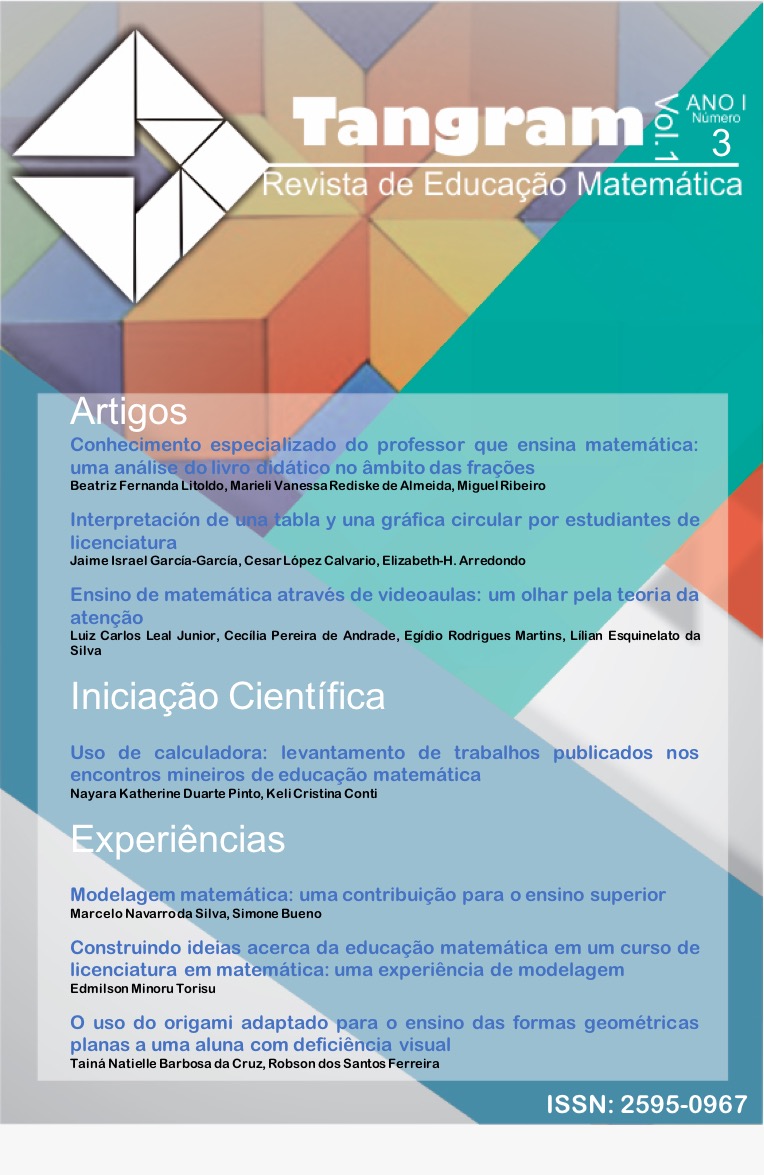Modelagem Matemática: uma contribuição para o ensino superior
DOI:
https://doi.org/10.30612/tangram.v1i3.7362Abstract
Este trabalho, no âmbito dos cursos superiores em administração e de áreas correlatas, corrobora com a utilização de atividades de Modelagem Matemática. Para tal, os alunos devem ser engajados na busca de problemas reais, assim, utilizando ferramentas matemáticas na construção de modelos para encontrar e/ou prever soluções. Então, discorre-se neste texto a experiência de uma oficina de Modelagem Matemática com alunos de graduação numa semana acadêmica de uma Instituição de Ensino Superior. Destaca-se que a atividade de Modelagem possibilitou o levantamento de uma problemática, por parte dos participantes, no caso, de prever a quantidade de garrafas PET produzidas e recicladas em determinado período, e verificar em qual momento essas quantidades se igualam. Os modelos encontrados pelos participantes levaram respostas aos questionamentos propostos na problemática e conclui-se que a atividade de Modelagem na formação inicial desses estudantes implicará no impulso de mudança de pensamento, sendo ele crítico e reflexivo.
Downloads
References
ALMEIDA, L.M.W.; DIAS, M.R. Modelagem matemática em cursos de formação de professores. In: BARBOSA, Jonei Cerqueira, CALDEIRA, Ademir Donizeti, ARAUJO, Jussara de Loiola. (orgs.). Modelagem Matemática na Educação Matemática Brasileira: Pesquisas e práticas educacionais. Recife, SBEM, p. 253–268, 2007.
ASSOCIAÇÃO BRASILEIRA DA INDÚSTRIA DO PET. São Paulo, 2012, disponível em http://www.abipet.org.br/index.html?method=mostrarInstitucional&id=4 acesso em 20 de novembro de 2016.
BACHELARD, G. A formação do espírito científico: uma contribuição para psicanálise do conhecimento. Rio de Janeiro, Contraponto, 1996.
BASSANEZI, R.C. Ensino–aprendizagem com modelagem matemática. São Paulo: Editora Contexto, 2002.
FRIEDMANN, C.V.P.; LOZANO, A.G. Modelagem e modelos discretos: uma necessidade do ensino atual. In: BARBOSA, Jonei Cerqueira, CALDEIRA, Ademir Donizeti, ARAUJO, Jussara de Loiola.(orgs.). Modelagem Matemática na Educação Matemática Brasileira: Pesquisas e práticas educacionais. Recife, SBEM, p. 133–148, 2007.
FUENTES, V.L.P; LIMA.R; GUERRA, D.S. Atitudes em relação à Matemática em estudantes de Administração. Revista Semestral da Associação Brasileira de Psicologia Escolar e Educacional (ABRAPEE), volume 13, número 1, p.131-141, janeiro/junho de 2009.
GRANDSARD, F.; SCHATTEMAN, A. Problem solving for first year university students In: BLUM, Werner; NISS, Mogens; HUNTLEY, Ian (orgs.). Modelling, applications and applied problem solving: teaching mathematics in a real context. Chichester –Inglaterra, Ellis Horwood, p. 177–183, 1989.
LESH, R. ENGLISH, L. Trends in the evolution of models & modeling perspectives on mathematical learning and problem solving. Annals of the 29th International Conference of the Mathematical Education Psychology Group, vol.1, pp.192-196. Melbourne, 2005.
NISS, M Models and Modelling in Mathematics Education. EMS Newsletter, p.49-52, Dezembro, 2012.
OSSIMITZ, G. Some theoretical aspects of descriptive mathematical models in economic and management sciences. In: BLUM, Werner; NISS, Mogens; HUNTLEY, Ian (orgs.) . Modelling, applications and applied problem solving: teaching mathematics in a real context. Chichester – Inglaterra, Ellis Horwood, p.43-48, 1989.
SANTOS, L.M.M.; BISOGNIN, V. Experiências de ensino por meio da Modelagem Matemática na Educação Fundamental. In: BARBOSA, Jonei Cerqueira, CALDEIRA, Ademir Donizeti, ARAUJO, Jussara de Loiola.(orgs.). Modelagem Matemática na Educação Matemática Brasileira: Pesquisas e práticas educacionais. Recife, SBEM, p. 99–114, 2007.
SILVA, M.N. Modelagem matemática na formação continuada: uma análise das concepções de professores em um curso de especialização. Dissertação de mestrado em Educação Matemática da Pontifícia Universidade Católica de São Paulo/PUC-SP, p. 160, 2009.
Downloads
Published
How to Cite
Issue
Section
License
Authors must accept the publication rules when submitting the journal, as well as agree to the following terms:
(a) The Editorial Board reserves the right to make changes to the Portuguese language in the originals to maintain the cultured standard of the language, while respecting the style of the authors.
(b) Authors retain the copyright and grant the journal the right to first publication, with the work simultaneously licensed under the Attribution-NonCommercial-ShareAlike 3.0 Brazil (CC BY-NC-SA 3.0 BR) that allows: Share - copy and redistribute the material in any medium or format and Adapt - remix, transform, and create from the material. CC BY-NC-SA 3.0 BR considers the following terms:
- Attribution - You must give the appropriate credit, provide a link to the license and indicate whether changes have been made. You must do so under any reasonable circumstances, but in no way that would suggest that the licensor supports you or your use.
- NonCommercial - You may not use the material for commercial purposes.
- Sharing - If you remix, transform, or create from material, you must distribute your contributions under the same license as the original.
- No additional restrictions - You may not apply legal terms or technological measures that legally restrict others from doing anything that the license permits.
(c) After publication, authors are allowed and encouraged to publish and distribute their work online - in institutional repositories, personal page, social network or other scientific dissemination sites, as long as the publication is not for commercial purposes.






